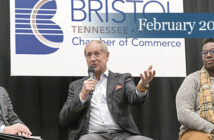By Scott Robertson
The table is set for a remarkable year. Nationally, the tax package has been signed into law, so money that has been on the sidelines should start flowing back into the economy. The stock market is strong. Unemployment is low. We are told our trade situation will begin improving as existing agreements are modified or scrapped. Senators Collins and Alexander say they have been told the healthcare insurance albatross will be addressed within the next couple of months.
Locally, there are several positive signs.
• Bristol, Va., is doing all it can to rebound from the folly of five years ago. The city government is implementing austerity measures and restructuring its massive debt load. The Commonwealth has kept its promises to Bristol as well. It’s been less than a year (May 10, in fact) since Stephen Moret, the president and CEO of the Virgnia Economic Development Partnership told Southwest Virginia leaders he would institute a six-point plan to ensure Southwest Virginia shared in the economic growth of the state. As he was making that pledge, Moret and other state officials were working to bring American Merchant’s 400-plus job towel manufacturing facility to Virginia, battling seven other states for the “get.” Bristol was the state’s choice for where that plant should be located. For months, the state worked with the city to make sure American Merchant was comfortable with the building (a two-years’ vacant former Ball Metals facility on Old Abingdon Highway), the workforce and the infrastructure.
• Regional economic cooperation is on the rise in Northeast Tennessee. The elected leaders of Bristol, Johnson City, Kingsport, Sullivan County and Washington County, Tenn., would not have stuck their necks out to recommend backing the funding for Aerospace Park without the knowledge that their business communities backed their play. At the November signing ceremony, both Mayor John Clark of Kingsport and Mayor Dan Eldridge of Washington County made statements sounding hopeful notes about more cooperative efforts in the future. NETWORKS Sullivan Partnership is carrying great momentum into 2018 based in large part on its remarkable success in Hawkins County. NETREP, meanwhile is working to leverage the quality-of-life assets in Carter and Unicoi County to help bring more millennials into the regional workforce. And the talk of efforts to market all of Northeast Tennessee, and perhaps Southwest Virginia, as a single region, seems to be gaining steam as well. If that can be done in a way that doesn’t repeat the old mistakes of the Regional Alliance days, everyone stands to benefit.
• Southwest Virginia is making progress in ways one might not have throught possible a year ago. When two of the region’s top employers, Mountain States Health System and Food City, came together last year to call attention and support to the economic development activities of the United Way of Southwest Virginia, people stood up and took notice. That organization is filling a vacuum in a way that no one else has. It is working with employers, educators, governments and other not-for-profit organizations to address the workforce needs of the region in both the short and long term. For how long have we said, “Somebody should do that?” Now somebody is.
• Even second-tier indicators such as retail are showing improvements. Tenants are trickling into The Falls. The first tenant for Tri-Cities Crossing (Tennessee’s largest KIA dealership) has been announced, with the promise of more to come. It’s never wise to put too many eggs into the retail basket, but those jobs tend to come in greater numbers when there is a stable economy around them. So the multiple hotel, restaurant and retail store announcements are welcome.
Are there reasons for caution? Of course. The tax cut package can only produce so much improvement in an economy that’s already humming along at functional full employment. We still face monumental challenges in education, opioid treatment and other economic development issues that have nothing to do with flat land and empty buildings. But here at the outset, our usual cautious optimism is perhaps a little less cautious than in previous years.




